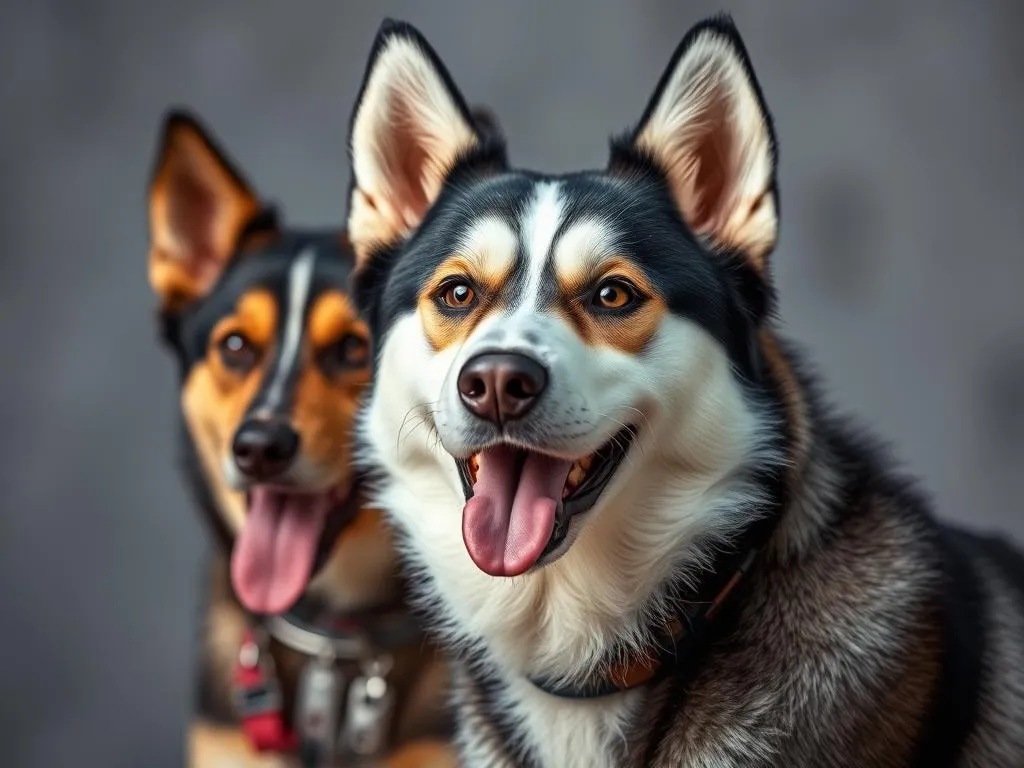
Introduction
Dog breeds are a source of fascination for many, with their varied characteristics, temperaments, and appearances capturing the hearts of dog lovers worldwide. Among these breeds, Huskies stand out for their striking looks and energetic personalities. Known for their thick coats, piercing blue or multi-colored eyes, and friendly demeanor, Huskies have become increasingly popular as family pets. However, what many prospective dog owners may not realize is the appeal of Husky mixes. These mixed breeds can offer unique traits and personalities that are influenced by their parent breeds.
In this article, we will delve into the world of Huskies, exploring their history, physical characteristics, and temperament. We will also examine popular Husky mixes, providing insights into their traits, care requirements, and the pros and cons of owning one. Finally, we’ll guide you on how to find the right Husky mix for your lifestyle.
Understanding Huskies
History and Origins
The Siberian Husky is a breed with a rich history that dates back thousands of years. Originating in Siberia, these dogs were bred by the Chukchi people, who relied on them for sledding, herding, and companionship. The breed’s resilience and adaptability made them ideal for harsh Arctic climates. As they were brought to North America in the early 20th century, their popularity surged, particularly among those drawn to the thrill of sled dog racing.
Culturally, Huskies hold significance among indigenous peoples, symbolizing loyalty and strength. Their evolution as sled dogs showcases their incredible stamina and work ethic, traits that have made them a beloved choice for families and outdoor enthusiasts alike.
Physical Characteristics
Huskies are medium-sized dogs, typically weighing between 35 to 60 pounds and standing about 20 to 24 inches tall at the shoulder. Their thick double coats come in various colors, including black, gray, red, and agouti, with distinctive facial markings. One of the breed’s most striking features is their eye color, which can range from blue to brown, and sometimes even one of each.
While generally healthy, Huskies are prone to certain health issues, including hip dysplasia, eye disorders such as cataracts, and skin conditions. Regular vet check-ups and a balanced diet can help mitigate these risks.
Temperament and Behavior
Huskies are known for their friendly, outgoing, and energetic personalities. These dogs thrive on social interaction, making them great companions for active families. However, their independent nature can sometimes manifest as stubbornness, requiring consistent training and patience.
Huskies are exceptionally intelligent but can be mischievous. They have a strong prey drive, so early socialization and training are crucial to help them coexist peacefully with other pets. Their playful and loving demeanor makes them well-suited for families, but it’s essential to provide them with plenty of exercise and mental stimulation to prevent behavioral issues.
Popular Husky Mixes
Overview of Mixed Breeds
Mixed breeds, or Husky mixes, are often sought after for their unique traits and the potential for hybrid vigor—an increase in health and vitality that can occur when two different breeds are combined. People choose Husky mixes for various reasons, including the desire for a specific temperament, physical attributes, or lower health risks associated with purebred dogs.
List of Popular Husky Mixes
Alaskan Husky
The Alaskan Husky is a versatile and energetic mix, primarily bred for their strength and endurance as sled dogs. They can vary significantly in appearance and temperament, as they are not a recognized breed but rather a category of mixed-breed dogs.
- Characteristics and Traits: Alaskan Huskies are known for their athleticism and friendly nature. They often bond closely with their human families.
- Typical Size and Appearance: They generally weigh between 40 to 60 pounds, with a sleek, muscular build.
- Pros and Cons: They are excellent companions for active individuals but require significant exercise and training.
Siberian Husky and German Shepherd Mix
This mix combines the intelligence and loyalty of the German Shepherd with the spirited nature of the Husky.
- Traits and Temperament: They are highly intelligent, making them easy to train, but they can also inherit the stubbornness of both breeds.
- Health Considerations: Potential health issues include hip dysplasia and eye problems, common in both parent breeds.
- Suitability for Families: They are great family dogs with protective instincts but require consistent training and socialization.
Husky and Labrador Retriever Mix
The combination of a Husky and a Labrador Retriever results in a friendly and energetic dog that is often very sociable.
- Overview of the Mix’s Characteristics: This mix tends to be playful, friendly, and eager to please, making them great family pets.
- Activity Level and Training Needs: They require a lot of exercise and mental stimulation, alongside consistent training.
- Popularity and Demand: The appeal of this mix lies in its balanced temperament and compatibility with families.
Husky and Poodle Mix (Huskypoo)
The Huskypoo is a delightful mix that combines the intelligence of the Poodle with the spirited nature of the Husky.
- Unique Traits and Grooming Needs: They can inherit a variety of coat types, often requiring regular grooming to manage shedding.
- Energy Levels and Exercise Requirements: Huskypoos are energetic and need daily exercise, along with mental challenges to keep them engaged.
- Ideal Living Conditions: They do well in active households with ample space to play.
Other Notable Mixes
There are various other appealing Husky mixes, including:
- Husky and Boxer: Known for their playful nature and loyalty.
- Husky and Rottweiler: This mix often results in a protective and intelligent companion.
Each mix brings its unique characteristics and charm, making them suitable for different types of families and lifestyles.
Care and Training for Husky Mixes
General Care Requirements
Caring for a Husky mix involves several key considerations:
- Nutrition and Dietary Needs: A balanced diet rich in high-quality protein is essential for maintaining their energy levels and overall health.
- Grooming Specifics Based on Coat Types: Depending on their coat type, grooming needs can vary. Regular brushing is crucial to manage shedding, especially during seasonal changes.
- Health Check-Ups and Vaccinations: Routine veterinary care is vital to monitor health and prevent common issues.
Training Tips
Training a Husky mix can be both rewarding and challenging:
- Importance of Early Socialization: Introducing them to various environments, people, and other animals early on can help them develop into well-adjusted adults.
- Effective Training Techniques: Positive reinforcement methods work best with Huskies. Consistency and patience are key.
- Common Behavioral Issues and How to Address Them: Addressing issues like stubbornness or excessive barking early on can prevent them from becoming problematic.
Exercise Needs
Huskies and their mixes are high-energy dogs that require daily exercise:
- Recommended Daily Exercise Routines: Aim for at least 1-2 hours of vigorous activity, such as running, hiking, or playing fetch.
- Activities Suitable for High-Energy Mixes: Agility training, obedience classes, and interactive games can provide necessary mental stimulation.
- Benefits of Physical Activity for Mental Stimulation: Regular exercise helps prevent boredom and associated behavioral issues, keeping your pup happy and healthy.
Pros and Cons of Owning a Husky Mix
Advantages
Owning a Husky mix comes with several benefits:
- Unique Traits and Versatility of Mixes: Each mix can offer a unique combination of traits from both parent breeds.
- Potential for Hybrid Vigor: Mixed breeds often benefit from improved health and longevity.
- Adaptability to Different Living Situations: Many Husky mixes can adapt well to various living environments, provided they receive adequate exercise.
Disadvantages
However, there are also challenges to consider:
- Potential for Unpredictable Traits: The mix can lead to varied temperaments and physical characteristics, making it essential to research both parent breeds.
- Challenges in Training and Socialization: Some mixes may inherit stubbornness, requiring more effort in training.
- Considerations for Living with a High-Energy Dog: Owners must be prepared for the demands of a high-energy dog, including regular exercise and mental stimulation.
Finding the Right Husky Mix for You
Choosing a Breeder vs. Adoption
When considering bringing a Husky mix into your home, you have two primary options:
- Pros and Cons of Purchasing from Breeders: Reputable breeders can provide information on the dog’s lineage and health but can be costly.
- Advantages of Adopting from Shelters or Rescues: Adopting can be a more affordable option and gives a dog in need a loving home.
- Key Questions to Ask When Selecting a Puppy or Rescue Dog: Inquire about the dog’s health history, temperament, and any special needs they may have.
Assessing Compatibility
Before bringing a Husky mix home, consider the following:
- Factors to Consider: Assess your lifestyle, living situation, and energy levels to ensure a good match.
- Importance of Meeting the Dog Before Adoption or Purchase: Spend time with the dog to gauge compatibility.
- Evaluating Energy Levels and Temperament: Understanding the dog’s energy levels and personality can help ensure a harmonious household.
Conclusion
The allure of Husky mixes lies in their unique combinations of traits, which can make them exceptional companions for the right families. However, prospective owners must be aware of the responsibilities involved in dog ownership, including training, exercise, and grooming. By carefully considering your lifestyle and the specific needs of a Husky mix, you can find the perfect furry friend to enrich your life.









